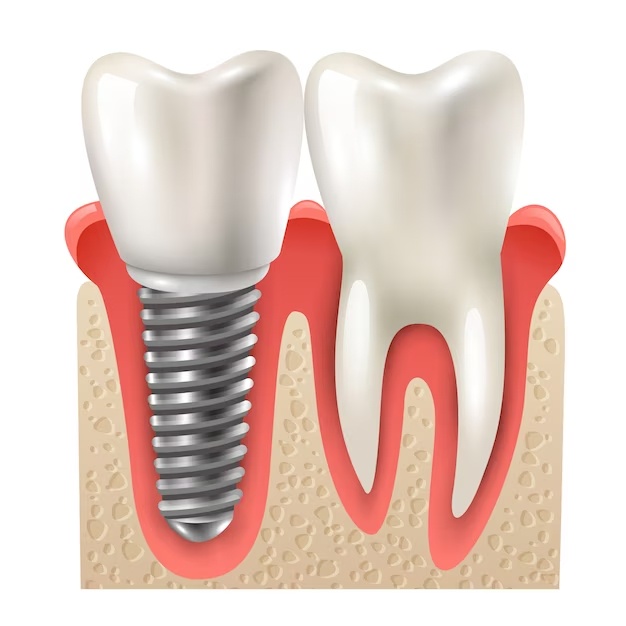Damaged or missing teeth are replaced with prosthetic teeth that look and function exactly like real teeth during dental implant surgery. The natural tooth roots are replaced with metal posts that imitate screws. Dental implant surgery may be the best option for insufficient natural tooth roots to sustain bridgework or dentures.
Who Can Consider Dental Implants?
Dental implants are surgically implanted into your jawbone to replace the roots of missing teeth. Since the implants' titanium connects with your jawbone, they won't slip, make noise, or damage your bone the way fixed bridgework or dentures might. Additionally, unlike your own teeth, which support conventional bridgework, the materials cannot deteriorate.
Dental implants near you can be an ideal solution for you if you are experiencing the following issues.
- Have missing teeth
- Other alternatives like dentures are not a suitable option
- Have healthy oral tissues
- Want to improve the function of your mouth like eating and speaking
- Are prepared to commit several months to the procedure
- Do not consume tobacco products
- Have a jawbone that's reached complete growth
- Have a sufficient bone to anchor the implants or able to have a bone graft
- Don't have any health issues that could interfere with bone healing
How to Take Care of Your Dental Implants
They offer replacement teeth that appear and function like natural teeth with a strong base. Dental implants must be properly cared for and maintained, much like natural teeth, to ensure their durability. Here are some tips recommended by our expert dentist in North Edmonton to maintain your dental implants.
Brush and floss regularly
It's essential to regularly brush and floss your dental implants to avoid plaque and bacteria buildup. Brush your teeth and implants twice a day using a toothbrush with a soft bristle and non-abrasive toothpaste. Even while cleaning the areas between implants and your natural teeth can be more difficult when you have implants, it's still very important. To adequately clean these areas, use water flossers or interdental brushes.
Visit your dentist regularly
In order to maintain your implants and natural teeth healthy, you must get routine dental exams and cleanings. Your dentist will be able to properly clean your teeth and implants as well as evaluate your implants and look for any indications of inflammation or infection. In order to keep an eye on the health of your implants and spot any problems immediately, they might perform X-rays.
Avoid hard or sticky foods
Chewing on items that are too hard or sticky can cause damage to your dental implants or the restoration that is placed over them. Avoid using excessive force when biting on things like ice, hard candies, popcorn, or other items. Consuming sticky foods like caramel, taffy, or gum might also cause your restoration or implant crown to become loose.
Quit smoking
Smoking can hinder recovery from implant surgery and raise the possibility of implant failure. Smoking also affects the gums' blood flow and increases the risk of gum disease, which can result in implant failure. To increase the longevity and success of your dental implants, it is recommended that you avoid smoking.
Wear a nightguard
Your implants and natural teeth may become damaged if you grind your teeth at sleep. Additionally, grinding can lead to additional dental issues like jaw pain and headaches. Your dentist may provide you with a nightguard that is fitted specifically for you to wear while you sleep in order to shield your teeth and dental implants from the adverse effects of grinding.
Follow immediate aftercare
Over the following 24 hours after receiving dental implants, you'll probably endure some pain and swelling. This is normal, and therefore shouldn’t alarm you.
The following steps should be taken after your procedure.
- For the first 8 to 12 hours following surgery, avoid moving around a lot and keep your head elevated in order to reduce bleeding by biting on the sponges that were placed in your mouth.
- When necessary, apply an ice pack to your face for 15 minutes at a time.
- Only soft foods and beverages should be consumed for the first 24 hours.
- Take the medications prescribed as your dentist has directed.
- For the first 24 hours, avoid rinsing your mouth
Advantages of Dental Implants
There are many advantages of dental implants in North Edmonton including
- Enhanced appearance
- Improved function of your mouth like speaking and chewing
- Comfortable
- Helps to boost your self-esteem
- Improved oral health
- Durable
Conclusion
For your dental implants to last a lifetime, proper maintenance is necessary. Regular dental exams, flossing, avoiding chewy or sticky foods, quitting tobacco use, and wearing a nightguard if you grind your teeth are all recommended. You can have a beautiful, efficient, and healthy smile for many years to come by paying attention to these recommendations. Caring for dental implants is not a time-consuming and tedious process. If you have any concerns about dental implants procedure or aftercare feel free to contact our dentist near you. Our team of experts is happy to help you achieve the smile you desire.


No comments yet